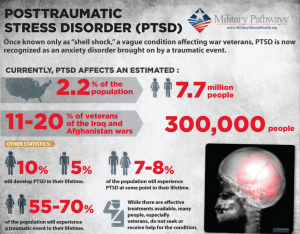At the 2016 AUSA Annual Meeting, during the Military Family Forum: Townhall with Senior Leaders a question was asked about access to behavioral health treatment. In his response, Secretary of the Army Eric Fanning stated that ‘behavioral health has been a priority’ of his, and that the ‘stigma of seeking behavioral help’ is an interesting phenomenon. Fanning went on to say that the ‘brain is the most complex organ in our body and we see specialists for everything else’ yet there is still somehow a stigma with seeking behavioral help for this part of our body.
Post-Traumatic Stress Disorder (PTSD) in particular has a strong stigma associated with it despite its common occurrence amongst our service members. These stigmas hinder individuals from proper treatment despite the fact that studies prove that nearly 20% of all returning service members meet criteria for PTSD. And relatedly, no one should ever ignore the fact that 20 veterans commit suicide each day. We should do anything and everything we can to reduce that rate of suicide. We can never forget that these men and women are the ones that risked their lives to protect our freedom at home. In doing so, they put their brain through stress that’s very difficult to overcome. These behavioral wounds are very real, but since they are not visible they don’t get the attention they deserve.
One such treatment should be massage therapy, which has its own stigma in the behavioral health world and is not covered by TRICARE. But, shouldn’t it be? There are numerous studies which prove massage as a stress reducer. Massage, reiki, reflexology, and other treatments can have a positive impact on treating behavioral issues, yet they are largely ignored by treatment providers.
PTSD symptoms are the result of imbalances in brain chemicals triggered by emotional stress. These chemicals affect behavior, feelings and cognition. By reliving the traumatic event, people with PTSD are always in a heightened state of anxiety. The brain is unable to turn off the response, and their bodies are constantly flooded with stress hormones that cause not only emotional, but physical pain, as muscles are tensed for action. Massage therapy and other bodywork can not only relax tensed muscles and ease the physical pain, they can trigger the body’s relaxation response, breaking the body’s anxiety cycle.
My exposure to this information first came from a non-profit organization by the name of CAUSE which provides free massage therapy sessions to wounded warriors and their families, in addition to other comfort services. I’ve been a board member at CAUSE for the past two years because I support the great work that they do and the services that they provide. Since 2003, CAUSE has been providing free massage services and they have been collecting responses from their participants. These numbers help prove what the scientific studies have already been telling us. Program participants have reported on average a 31% decrease in physical pain, a 43% decrease in stress levels, and a 55% improvement in sleep. Yet somehow these treatments are largely ignored by the medical treatment plans given to our veterans. These types of treatments should be covered and included with traditional stress reduction treatments.
Secretary Fanning commented that seeking assistance with behavioral health is ‘a sign of strength’ and ‘resilient soldiers and their families need to be fully equipped with access to behavioral health treatments’. Our military community needs to fight these stigmas and get our service members access to ALL programs and treatments that help reduce the behavioral wounds of war.


